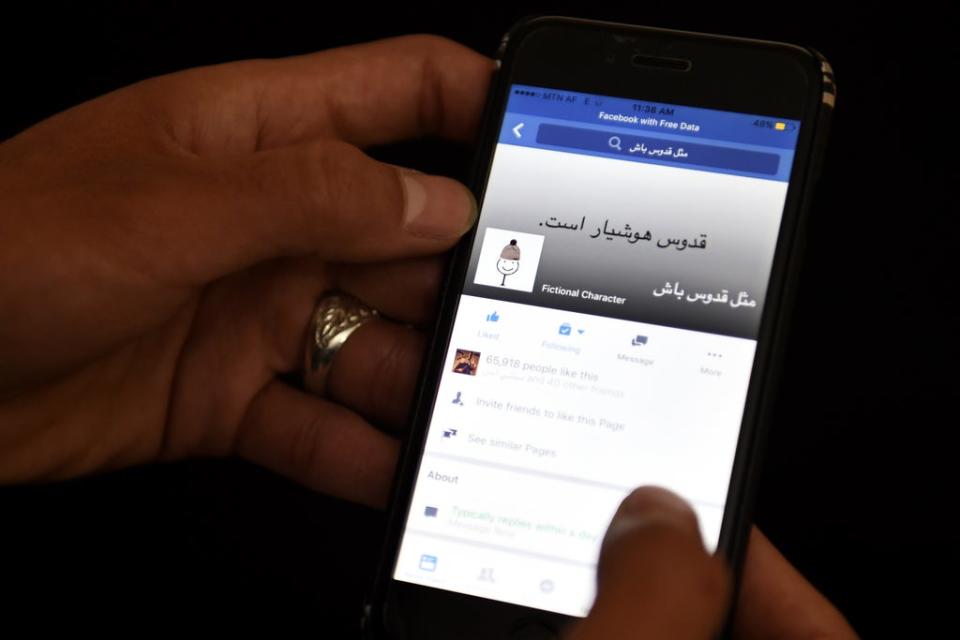Facebook moves to protect users in Afghanistan from being targeted by the Taliban

Facebook has brought in new security measures to protect its users in Afghanistan over concerns that the Taliban, which continues to tighten its control over the country, is using social media platforms to track its opponents.
The social media giant launched a new feature on Thursday for its Afghan users to lock their account on the platform, Nathaniel Gleicher, Head of Security Policy at Facebook, announced on Twitter.
“When their profile is locked, people who aren’t their friends can’t download or share their profile photo or see posts on their timeline,” Mr Gleicher noted.
On Facebook-owned Instagram, the company said it is also rolling out pop-up alerts in Afghanistan with specific steps on how users could protect their accounts.
Mr Gleicher also announced that Facebook has removed the ability for users to view and search the “Friends” list for the accounts on its platform in Afghanistan to help protect people from being targeted by the Taliban.
And for users outside Afghanistan with friends in the country, Facebook shared a set of guidelines to tighten their visibility settings.
“Many of these were informed by feedback from activists, journalists and civil society groups,” Mr Gleicher noted.
2/ Over the past week, our teams have been working around the clock to do everything we can to help keep people safe. While we have to be careful to avoid tipping off bad actors, here are a few security measures we’ve rolled out for people in country to protect their accounts.
— Nathaniel Gleicher (@ngleicher) August 19, 2021
“We’re working closely with our counterparts in industry, civil society, and government to provide whatever support we can to help protect people,” he said.
The company has also started a special operations centre to respond to new threats as they emerge, the head of security policy noted.
4/ We’ve launched a one-click tool for people in Afghanistan to quickly lock down their account. When their profile is locked, people who aren’t their friends can’t download or share their profile photo or see posts on their timeline. pic.twitter.com/pUANh5uBgn
— Nathaniel Gleicher (@ngleicher) August 19, 2021
“We know that no single step is enough by itself in crises like this, but we’re watching closely as the situation develops and will take steps to help protect people in real time,” Mr Cleicher added.
The current moves by the company follow its measures earlier in the week to ban content supporting the Taliban on all of its platforms, including Instagram and Whatsapp.
“The Taliban is sanctioned as a terrorist organisation under US law and we have banned them from our services under our Dangerous Organization policies,” a company spokesperson had toldThe Independent.
Facebook said a dedicated team of Afghanistan experts, who are native Dari and Pashto speakers and have knowledge of local context, are helping the company identify emerging issues on the platform.
“We remove accounts maintained by or on behalf of the Taliban and prohibit praise, support, and representation of them,” the company’s spokesperson had said.
Meanwhile Twitter said earlier this week that it is monitoring the “rapidly evolving” situation in Afghanistan, adding that its top priority is to keep people safe, and remain vigilant.
Here's what Twitter is saying: "The situation in Afghanistan is rapidly evolving. We’re also witnessing people in the country using Twitter to seek help and assistance. Twitter’s top priority is keeping people safe, and we remain vigilant.”
— Sam Shead (@Sam_L_Shead) August 17, 2021
“We’re also witnessing people in the country using Twitter to seek help and assistance,” CNBC reported, quoting a Twitter spokesperson.
The microblogging platform’s lack of action led to criticism from people, including supporters of Donald Trump, who said the former president is still banned for life from Twitter while the spokespeople for the Taliban are allowed to post.
Read More
Biden says US troops could stay in Afghanistan past 31 August
Violence and desperation as Afghans try to flee country
The Taliban: Who are they, who are the leaders and what do they want?

 Yahoo Finance
Yahoo Finance 